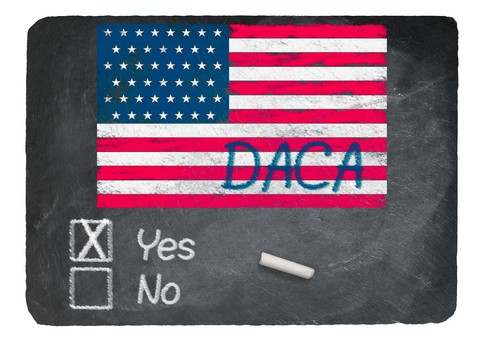On December 04, 2020, a U.S. District Court in the state of New York ordered the Department of Homeland Security (DHS) to fully reinstate the DACA Program. The order, which was effective immediately, requires DHS to start accepting new initial DACA applications, issue work permits with a validity period of two years, and allow DACA recipients to apply for Advance Parole.
The order effectively directs DHS to adhere to the terms of the DACA policy that was in effect prior to September 05, 2017, which was when the Trump administration attempted to end the program.
BACKGROUND
In 2012, the Obama administration announced Deferred Action for Childhood Arrivals (DACA), a program that offers work permits and deportation relief to undocumented immigrants brought to the United States as children.
On September 05, 2017, the Trump administration announced the program’s termination.
Following the announcement of the program’s termination, multiple lawsuits filed from around the United States challenged the lawfulness of how the administration attempted to terminate the DACA program.
In response to these lawsuits, courts issued injunctions halting the complete termination of the program, and allowing previous DACA recipients the ability to continue to renew their deferred action and employment authorization in two-year increments.
The U.S. Supreme reviewed these cases and on June 18, 2020, issued a decision, which blocked the government’s attempt to terminate the DACA program.
In response to the decision issued by the Supreme Court, Acting DHS Secretary Chad Wolf issued a Memorandum, which again attempted to restrict the DACA program and its recipients. The Memorandum instructed U.S. Citizenship and Immigration Service (USCIS) to reject all new, initial DACA applications, reject all applications for advance parole absent exceptional circumstances, and limit the period of DACA renewals to one year.
Following a court challenge, on November 14, 2020, a court issued a decision finding that Chad Wolf was not properly appointed as the Acting Secretary of DHS and was thus not lawfully serving when he issued the Memorandum. Based on this finding, on December 04, 2020, the court ordered DHS to fully reinstate the DACA program.
USCIS DACA POLICY AS OF DECEMBER 07, 2020
In order to comply with the court’s order, USCIS has updated its policy to reflect the following:
* Accepting first-time requests for consideration of deferred action under Deferred Action for Childhood Arrivals (DACA) based on the terms of the DACA policy in effect prior to September 5, 2017, and in accordance with the Court’s December 4, 2020, order;
* Accepting DACA renewal requests based on the terms of the DACA policy in effect prior to September 5, 2017, and in accordance with the Court’s December 4, 2020, order;
* Accepting applications for advance parole documents based on the terms of the DACA policy prior to September 5, 2017, and in accordance with the Court’s December 4, 2020, order;
* Extending one-year grants of deferred action under DACA to two years; and
* Extending one-year employment authorization documents under DACA to two years.
ELIGIBILITY REQUIREMENTS FOR FIRST TIME APPLICANTS
You may be eligible to apply for DACA if you meet the following requirements:
1. Were under the age of 31 as of June 15, 2012;
2. Came to the United States before reaching your 16th birthday;
3. Have continuously resided in the United States since June 15, 2007, up to the present time;
4. Were physically present in the United States on June 15, 2012, and at the time of making your request for consideration of deferred action with USCIS;
5. Had no lawful status on June 15, 2012;
6. Are currently in school, have graduated or obtained a certificate of completion from high school, have obtained a general education development (GED) certificate, or are an honorably discharged veteran of the Coast Guard or Armed Forces of the United States; and
7. Have not been convicted of a felony, significant misdemeanor, or three or more other misdemeanors, and do not otherwise pose a threat to national security or public safety.
Potential first-time DACA applicants are strongly encouraged to consult with experienced immigration counsel about their eligibility required for DACA consideration.
REQUIREMENTS FOR DACA RECIPIENTS TO APPLY FOR ADVANCE PAROLE
* Please note traveling outside the United States is risky, even with an approved Advance Parole, travel document. DACA recipients should carefully review their case and immigration history with an experienced immigration attorney before attempting any travel outside the United States.
As was previously the case, DACA recipients are again eligible to apply for Advance Parole or a Travel Document, which will allow the approved DACA recipient to travel abroad and return to the United States legally.
In order to apply for Advance Parole, the DACA recipient must show that the proposed trip is for educational, employment, or urgent humanitarian purposes.
For more information on DACA, the status of the DACA program, or other information related to immigration issues, please contact Kolko & Casey, P.C.
